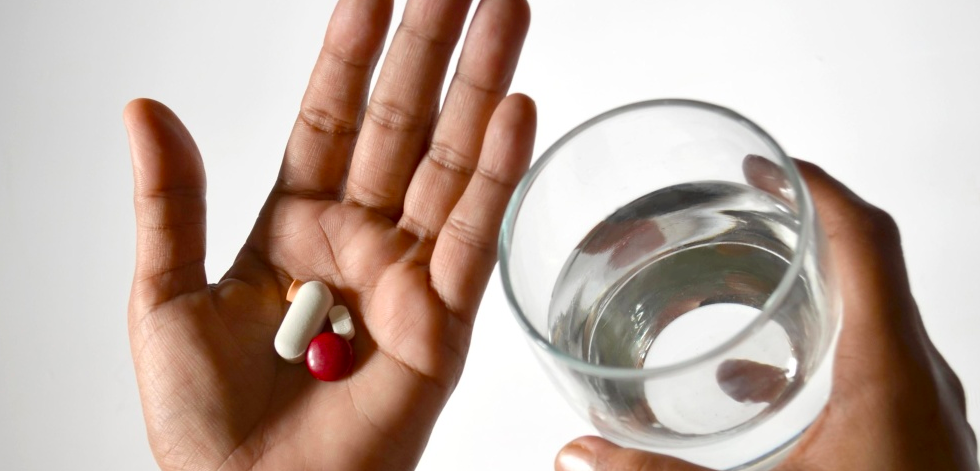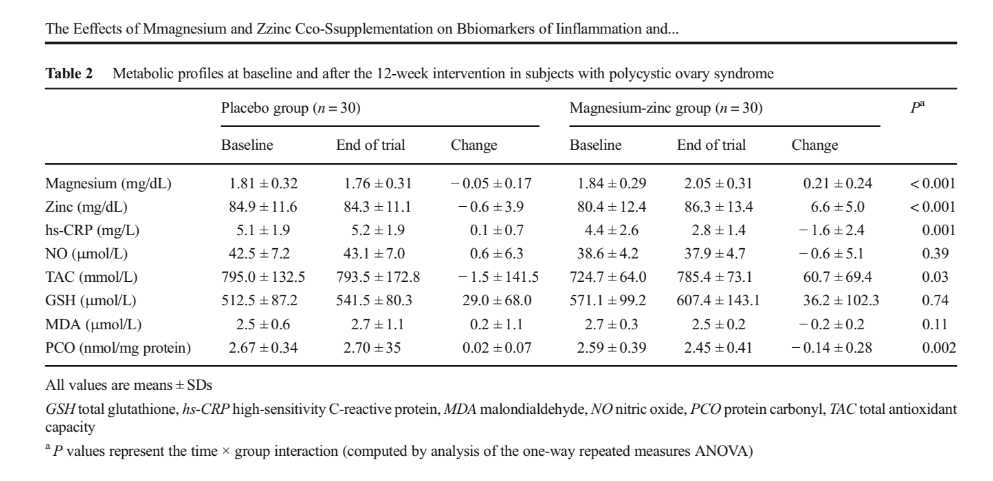It’s known that in PCOS, insulin resistance causes oxidative stress and inflammation to be carried in our blood. What’s less well known is just how important a role minerals like magnesium and zinc play with regard to antioxidant status and inflammation.
60 women with PCOS took part in a recent study. These women were between the ages of 18 and 40, were matched for BMI, and randomized to take 250mg of magnesium paired with 50mg of zinc twice daily. Half the group was given placebos, and half of them were given the minerals. Aside from these supplements, the women were told not to make any changes to their regular lifestyle habits.
At the end of the 12-week study, the following were measured:
- BMI
- Nitric oxide Status
- hs-CRP – marker of inflammation
- Protein Carbonyl (marker of oxidative stress)
- Glutathione status (glutathione is major intracellular antioxidant)
- Total plasma antioxidant capacity (TAC) – a marker associated with better levels of antioxidant status.
- Malondialdehyde (a marker that is associated with oxidative stress)
Minerals Reduced Inflammation in PCOS
It was noted that the group that took the supplements had increasedserum magnesium and zinc levels (which was to be expected). Additionally, it was noticed that there was a reduction of hs-CRP and protein carbonyl, as well as an increase inplasma total antioxidant capacity.
When the white blood cells were analyzed, it wasalso discovered that levels of the inflammation-promoting TNF alpha and IL1 were reduced. These are some of the most potent causes of inflammation that you will see in women with PCOS, and are often linked to many of the chronic health issues that are common with the condition such as diabetes, heart disease, and even issues with mood like depression and anxiety.
Prior studies have already documented that these factors play a main role in hyperinsulinemia and the vascular inflammation process through multiple actions [2, 3]. Hyperinsulinemia is one of the triggers of the elevated levels of testosterone that cause hair loss, hirsutism, irregular cycles and the inflammatory cystic acne that we see so commonly in PCOS.
When it comes to these important minerals, other studies have shown that magnesium can decrease inflammation by reducing the production of reactive oxygen species [5]. Magnesium has also been found to increase the activity of glutathione peroxidase—the enzyme that is responsible for keeping our cells protected from damage.
In past studies, zinc has also proven to have a variety of anti-inflammatory actions in our cells. In particular, zinc protects our cells’ plasma membranes from the damaging lipid peroxides (inflammatory fatty acids) that are typically found in the blood of women PCOS. These lipid peroxides exist because of the amount of fat cell inflammation in women with the condition. [4]
It’s important to note that taking such a high dose of zinc as in this study on a long-term basis may impair our ability to absorb copper. This is why zinc and copper are often complexed together in most supplements: to prevent this kind of deficiency if zinc is to be taken long term.
*Note: magnesium oxide and zinc sulfate were used in this study, though chelated minerals like bisglycinates and citrates often have better absorption.
Article References:
- Afshar Ebrahimi, FaranehThe Effects of Magnesium and Zinc Co-Supplementation on Biomarkers of Inflammation and Oxidative Stress, and Gene Expression Related to Inflammation in Polycystic Ovary Syndrome: a Randomized Controlled Clinical TrialBiological Trace Element Research [0163-4984]yr:2017;
- Jialal I, Devaraj S, Venugopal SKC-reactive protein: risk marker or mediator in atherothrombosis?Hypertension44(1):6-11;:https://doi.org/10.1161/01.HYP.0000130484.20501.df.
- Wellen KE, Hotamisligil GSInflammation, stress, and diabetesJ Clin Invest115(5):1111-1119;:https://doi.org/10.1172/35..
- Barman S, Srinivasan KAttenuation of oxidative stress and cardioprotective effects of zinc supplementation in experimental diabetic ratsBr J Nutr117(03):335-350;:https://doi.org/10.1017/S0007114517000174.
- Liu YX, Guo YM, Wang ZEffect of magnesium on reactive oxygen species production in the thigh muscles of broiler chickensBr Poult Sci48(1):84-89;:https://doi.org/10.1080/00071660601148187.


